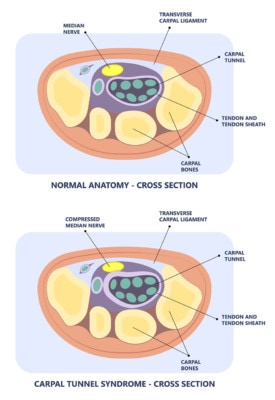A Connection Between Carpal Tunnel Syndrome and Migraines?
Could there be a connection between Carpal Tunnel Syndrome and Migraines?
Carpal Tunnel Syndrome (CTS) occurs when the median nerve in the wrist is physically compressed, either by external forces or by conditions within the body itself, affecting nerve function. The median nerve runs from the cervical spine down into the hand and through narrow passageway within your wrist. When this nerve has problems, it can cause pain, numbness and tingling in the wrist, thumb and first three fingers.

Rumruay/Shutterstock
Migraine is a neurological disease thought to involve nerves and muscles. There is a collection of important nerves which extend from the cervical spinal cord in the neck through the brainstem and up into several sections of the brain. Inappropriate communication between these nerves and the outer covering of the brain and its blood vessels is thought to play a role in how Migraines form. What causes this inappropriate communication?
Historically, Migraines have not been considered a compression neuropathy. But recent evidence and studies seem to support that some Migraines could indeed be a head and neck nerve compression issue. Research has shown that upper cervical nerve blocks and facet trigger point injections have been helpful in treating Migraines, and studies have used targeted injections of Botox in the treatment of Migraines.
A new study sought to discern if, given that information, there is a connection between Carpal Tunnel Syndrome and Migraines. To do that they used data from a 2010 National Health Interview Survey of over 25,000 patients reporting symptoms of either, or both, Carpal Tunnel Syndrome and Migraines.
What did they find? Both CTS and Migraines were generally associated with being female, having diabetes, being overweight and smoking; Migraines generally affecting younger age patients, and CTS older patients. More than twice as many patients who had Carpal Tunnel Syndrome had Migraines compared to those without the wrist problem. In addition, almost triple the number of patients who had Migraine headaches also had CTS versus those without headaches.
The upshot? This was the first study to demonstrate an association between Carpal Tunnel Syndrome and Migraines, and additional studies are planned to determine whether or not a genetic tendency for nerve compression exists. However, for a physician who examines patients with and treats, both Carpal Tunnel Syndrome and Migraines, the neck causes headaches and pinched nerves in the neck lead to CTS…so why is this a surprise?

If you have questions or comments about this blog post, please email us at [email protected]
NOTE: This blog post provides general information to help the reader better understand regenerative medicine, musculoskeletal health, and related subjects. All content provided in this blog, website, or any linked materials, including text, graphics, images, patient profiles, outcomes, and information, are not intended and should not be considered or used as a substitute for medical advice, diagnosis, or treatment. Please always consult with a professional and certified healthcare provider to discuss if a treatment is right for you.